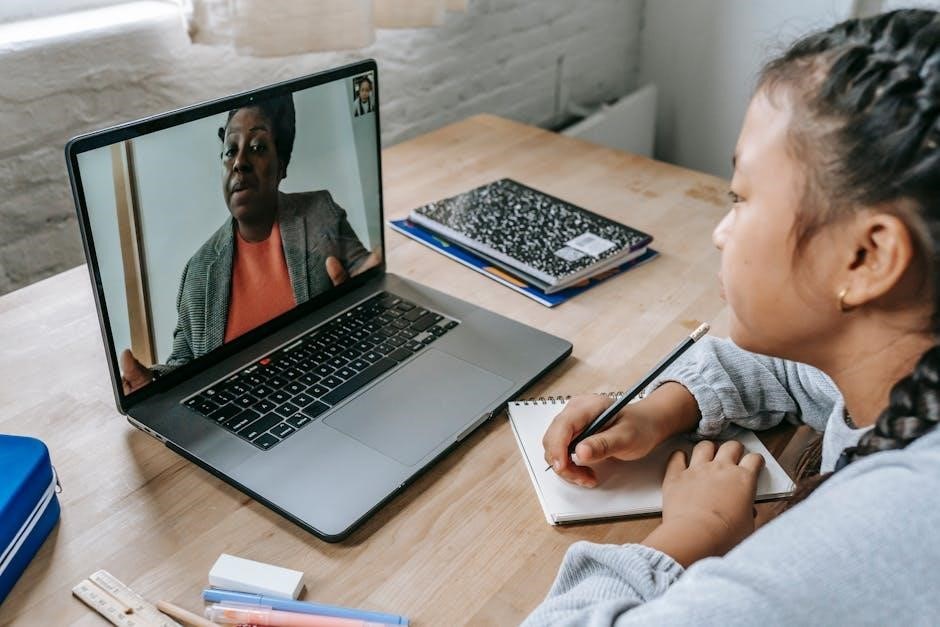Mastering effective learning involves adopting metacognitive strategies, cultivating a growth mindset, and using practical techniques to enhance academic success, as outlined in Teach Yourself How to Learn.
Overview of the Book
Teach Yourself How to Learn by Saundra Yancy McGuire provides practical strategies for students to master effective learning. The book focuses on metacognition, mindset, and study skills, offering insights into how students can achieve academic success. McGuire emphasizes the importance of understanding oneself as a learner and using simple, research-based techniques to improve learning outcomes. Written in an accessible style, the book empowers students to take control of their education and achieve their full potential.
Importance of Self-Directed Learning
Self-directed learning empowers students to take ownership of their education, fostering independence and accountability. By developing metacognitive skills and a growth mindset, learners can identify their strengths, weaknesses, and learning styles, enabling them to adapt strategies that suit their needs. This approach not only enhances academic performance but also prepares individuals for lifelong learning, equipping them with the tools to succeed in an ever-changing world.

Mindset and Its Impact on Learning
Cultivating a growth mindset significantly enhances effective learning success by fostering resilience and a love for challenges, as emphasized in Teach Yourself How to Learn.
Understanding the Growth Mindset
A growth mindset, as explained in Teach Yourself How to Learn, is the belief that abilities and intelligence can be developed through effort and persistence. It emphasizes embracing challenges as opportunities for growth, viewing effort as a path to mastery, and persisting despite obstacles. This mindset contrasts with a fixed mindset, which sees abilities as innate and unchangeable. Cultivating a growth mindset fosters resilience, enhances learning, and leads to greater academic and personal success.
Strategies to Cultivate a Positive Learning Mindset
Cultivating a positive learning mindset involves setting clear goals, practicing self-reflection, and embracing challenges as growth opportunities. According to Teach Yourself How to Learn, students should focus on effort over perfection, celebrate progress, and reframe failures as learning experiences. Engaging in metacognitive practices, such as monitoring understanding and adjusting strategies, also fosters resilience and confidence, leading to a more productive and enjoyable learning journey.

Mastering Metacognition
Metacognition is the awareness of one’s thinking processes, enabling learners to plan, monitor, and evaluate their learning strategies effectively, as emphasized in Teach Yourself How to Learn.
What is Metacognition?
Metacognition is the process of thinking about and reflecting on one’s own learning and problem-solving strategies. It involves planning, monitoring, and evaluating mental processes to optimize understanding and retention. By fostering awareness of strengths and weaknesses, metacognition empowers learners to adapt strategies, improve decision-making, and achieve deeper comprehension of material, as highlighted in Teach Yourself How to Learn.
Practical Techniques for Metacognitive Learning
Practical metacognitive techniques include self-assessment, goal-setting, and reflective thinking. Students can use strategies like the Pomodoro Technique to monitor progress and adjust study methods; Reflecting on what was learned and identifying gaps enhances understanding. These techniques, as discussed in Teach Yourself How to Learn, empower learners to take control of their education, fostering independence and academic success through intentional, self-aware learning practices.

Bloom’s Taxonomy: A Framework for Learning
Bloom’s Taxonomy offers a hierarchical framework for learning, categorizing objectives from knowledge recall to creation, guiding students to develop critical thinking and creativity in their academic journey.
Understanding Bloom’s Taxonomy Levels
Bloom’s Taxonomy is a hierarchical model of learning objectives, divided into six levels: Remember, Understand, Apply, Analyze, Evaluate, and Create. These levels progress from basic knowledge recall to complex critical thinking and creativity. By understanding these levels, students can structure their learning to move from memorization to deeper comprehension and application, fostering a more effective and meaningful academic experience.
Applying Bloom’s Taxonomy in Study Strategies
Students can apply Bloom’s Taxonomy by aligning study strategies with its levels. For Remember and Understand, use techniques like flashcards and summaries. Apply and Analyze can be addressed through problem-solving and comparing ideas. Evaluate and Create levels benefit from debates and project-based learning. This structured approach ensures comprehensive understanding and critical thinking, guiding learners to move beyond memorization to meaningful application and innovation in their studies.
Effective Study Skills for Success
Effective study skills empower learners to achieve academic success through active reading, advanced note-taking, and time management. These strategies enhance metacognition, fostering a growth mindset and lifelong learning.
Advanced Note-Taking Techniques
Advanced note-taking techniques, such as the Cornell Method and mind mapping, help learners organize and retain information effectively. These strategies emphasize summarizing key points, using symbols, and reviewing notes regularly. By actively engaging with material, students enhance comprehension and retention, fostering a deeper understanding of complex concepts. These methods align with metacognitive practices, encouraging learners to reflect on their learning process and identify areas for improvement.
Active Reading Strategies
Active reading involves engaging deeply with texts through techniques like previewing, skimming, and annotating. Strategies such as SQ3R (Survey, Question, Read, Recite, Review) and KWL (Know, Want to Know, Learned) help students connect with material. By asking questions, summarizing content, and reflecting on key points, learners enhance comprehension and retention. These methods promote critical thinking and ensure a meaningful interaction with the material, making learning more effective and enjoyable.

Time Management Strategies
Effective time management involves prioritizing tasks, setting realistic goals, and minimizing distractions. Techniques like time blocking and avoiding procrastination can significantly enhance productivity and academic success.
Time Blocking for Productivity
Time blocking involves scheduling tasks into dedicated intervals, minimizing distractions. By allocating specific times for studying, breaks, and leisure, students can enhance focus and productivity. This strategy, as outlined in Teach Yourself How to Learn, helps prioritize tasks effectively, ensuring a balanced and efficient use of time. By using tools like calendars or planners, learners can stay organized and achieve their academic goals with reduced stress.
Prioritizing Tasks Effectively
Effective task prioritization is crucial for maximizing productivity. By categorizing tasks using the Eisenhower Matrix—urgent and important, important but not urgent, urgent but less important, and neither—learners can focus on what truly matters. Breaking tasks into smaller, manageable steps and setting clear goals ensures efficiency. This approach, emphasized in Teach Yourself How to Learn, helps students allocate time wisely, reducing stress and enhancing academic success.
Avoiding Procrastination
Avoiding procrastination requires breaking tasks into smaller, manageable steps and setting clear deadlines. Start with the most challenging tasks when focus is highest. Use time-blocking to allocate specific periods for studying. Celebrate small progress to maintain motivation. These strategies, as discussed in Teach Yourself How to Learn, help learners overcome delays and build consistent study habits for long-term success.

Test Preparation Techniques
Effective test preparation involves understanding exam formats, reviewing past papers, and practicing retrieval exercises to reinforce learning, as emphasized in Teach Yourself How to Learn.
Strategies for Effective Exam Preparation
Effective exam preparation begins with understanding the exam format and content. Use active recall by testing yourself regularly, and review past papers to familiarize yourself with question types. Prioritize high-impact topics and create detailed study schedules. Engage in metacognition by reflecting on your learning progress and adjusting strategies as needed. Practice time management during mock exams to build confidence and reduce anxiety, ensuring you’re well-prepared for the actual test.
Practicing with Past Papers
Practicing with past papers is a powerful strategy to enhance exam readiness. It helps identify knowledge gaps, familiarizes you with question formats, and improves time management. Regularly reviewing past exams allows you to refine your approach, focus on weak areas, and build confidence. This method, emphasized in Teach Yourself How to Learn, ensures you’re well-prepared and can tackle challenges effectively, leading to better academic outcomes and reduced test anxiety.

Overcoming Learning Challenges
Effective learning requires addressing obstacles like information overload and stress. Strategies such as metacognition and time management help students navigate challenges, fostering resilience and academic success.
Dealing with Information Overload
Managing information overload requires strategic approaches like prioritizing key concepts, using organizational frameworks, and applying metacognitive techniques. By focusing on understanding rather than memorization, learners can filter essential content effectively, reducing overwhelm and enhancing retention. Active learning strategies, such as summarizing and self-quizzing, also help in distilling complex material into manageable parts, ensuring clarity and deeper comprehension.
Managing Study-Related Stress
Managing study-related stress involves adopting a balanced approach to learning. Techniques like time blocking, task prioritization, and mindfulness can help reduce anxiety. Breaking tasks into smaller, manageable steps and practicing self-care, such as regular breaks and exercise, are essential. Cultivating a positive mindset and seeking support from peers or mentors can further alleviate stress, ensuring a healthier and more productive learning experience.

Leveraging Technology for Learning
Leverage educational apps and online platforms to enhance learning. Tools like digital flashcards, note-taking apps, and interactive resources can streamline study processes, fostering engagement and productivity.
Utilizing Educational Apps
Educational apps are powerful tools that streamline learning. Apps like digital flashcards, note-taking software, and interactive platforms enhance organization, retention, and engagement. They provide personalized learning paths, enabling students to tailor their study routines. These resources often include features like progress tracking and multimedia content, making complex concepts more accessible. By integrating such apps, learners can optimize their study time and achieve better academic outcomes.
Benefits of Online Learning Platforms
Online learning platforms offer unparalleled flexibility, allowing students to access courses anytime and from any location. They provide a wealth of resources, including video lectures, interactive quizzes, and discussion forums, fostering a dynamic learning environment. These platforms cater to diverse learning styles and promote self-paced study. Additionally, they often feature tools for tracking progress and connecting with peers, enhancing overall educational experiences and outcomes for learners of all levels.
Nutrition and Health for Optimal Learning
A balanced diet rich in brain-boosting foods, along with adequate hydration and sleep, enhances cognitive function and energy levels, supporting effective learning and memory retention.
The Role of Nutrition in Cognitive Function
Nutrition significantly impacts brain function, with certain foods enhancing memory, focus, and mental clarity. A diet rich in omega-3 fatty acids, antioxidants, and B vitamins supports neural health. Incorporating whole foods like fish, nuts, and berries promotes cognitive performance. Proper hydration and balanced meals stabilize energy levels, preventing mental fatigue. Prioritizing nutrient-dense foods fosters an optimal learning environment, ensuring the brain functions at its best for academic success.
Importance of Sleep for Memory Retention
Sleep is crucial for memory retention, as it allows the brain to consolidate information and strengthen neural connections. During sleep, the brain processes and organizes memories, transferring them from short-term to long-term storage. Lack of sleep impairs cognitive function, reducing focus and retention abilities. Prioritizing quality sleep enhances learning efficiency, ensuring better absorption and recall of information. A well-rested mind is essential for optimal academic performance and overall mental clarity.

Active Learning Techniques
Engage in group study sessions, teach others, and actively participate in discussions to deepen understanding and reinforce learning through interactive and collaborative methods.
Engaging in Group Study Sessions
Group study sessions foster collaborative learning, allowing students to clarify doubts, share insights, and gain diverse perspectives. By teaching and explaining concepts to peers, individuals reinforce their own understanding and retention of material, enhancing overall learning effectiveness through active participation and shared problem-solving.
Teaching Others to Reinforce Learning
Teaching others is a powerful strategy to deepen understanding and retention. By explaining concepts to peers, students clarify their own knowledge, identify gaps, and solidify memories. This method, emphasized in Teach Yourself How to Learn, enhances metacognition and reinforces learning through active engagement and feedback, making it a valuable tool for academic success.
Seeking Help and Resources
Teach Yourself How to Learn emphasizes the importance of seeking help and utilizing resources. McGuire provides strategies to identify when assistance is needed and how to ask effectively, fostering academic success and personal growth through targeted support and practical advice.
When and How to Ask for Help
Saundra McGuire emphasizes the importance of recognizing when help is needed. She encourages students to seek assistance early, fostering a proactive approach to learning. McGuire provides practical strategies for identifying knowledge gaps and effectively communicating with instructors or peers. By understanding when to ask for help, students can address challenges promptly, ensuring deeper understanding and academic success. This approach aligns with her broader philosophy of empowering learners through metacognition and strategic resource utilization.
Utilizing Academic Support Services
Academic support services, such as tutoring, workshops, and study groups, are essential tools for student success. Saundra McGuire highlights the importance of leveraging these resources to reinforce learning strategies and address specific challenges. By actively engaging with support services, students can deepen their understanding of course material and develop the skills necessary for long-term academic achievement, aligning with the principles outlined in Teach Yourself How to Learn.
Reflection and Adjustment
Reflection involves evaluating learning progress and understanding strengths, while adjustment applies metacognitive strategies to improve effectiveness, enhancing overall learning outcomes as emphasized in McGuire’s approach.
Evaluating Your Learning Progress
Evaluating learning progress involves self-assessment, identifying knowledge gaps, and measuring understanding through reflection and feedback. McGuire emphasizes metacognitive strategies to track growth, ensuring alignment with learning goals and fostering continuous improvement in academic performance and personal development.
Adjusting Strategies for Better Outcomes
Adapting learning strategies involves reflecting on what works, seeking feedback, and refining techniques to optimize results. McGuire’s approach encourages students to tweak their methods, embrace new tools, and stay flexible, ensuring continuous improvement and achieving academic success through tailored, effective learning practices.
Teach Yourself How to Learn equips students with metacognition, mindset shifts, and practical strategies, empowering them to embrace lifelong learning and achieve lasting academic and personal success.
Summarizing Key Takeaways
Teach Yourself How to Learn emphasizes metacognition, mindset shifts, and practical strategies to enhance learning. It highlights the importance of understanding oneself as a learner, cultivating a growth mindset, and applying techniques like active reading and note-taking. The book empowers students to take control of their education, fostering motivation and resilience. By mastering these strategies, learners can achieve academic success and develop a lifelong commitment to effective learning.
Encouraging Lifelong Learning
Teach Yourself How to Learn inspires a commitment to lifelong learning by equipping students with metacognitive strategies and a growth mindset. It encourages embracing challenges, fostering curiosity, and cultivating resilience. By mastering these tools, learners can adapt to new situations, pursue continuous growth, and maintain intellectual curiosity throughout their lives, making education a lifelong journey of self-improvement and discovery.

Additional Resources and References
Teach Yourself How to Learn by Saundra Yancy McGuire offers practical strategies for academic success. Additional resources, including PDFs and online tools, are available on platforms like Internet Archive and educational websites.
Recommended Reading and Tools
For deeper insights, Teach Yourself How to Learn by Saundra Yancy McGuire is a must-read, offering practical strategies for mastering metacognition, mindset, and study skills. The book is available as a PDF and in print. Additional tools include online learning platforms, educational apps, and study guides that complement the strategies outlined in the book, helping learners achieve academic success and lifelong learning goals effectively.
Online Communities for Support
Join online forums like Reddit’s r/learnprogramming and Stack Overflow to connect with learners and educators. These communities offer valuable insights, resources, and support for mastering learning strategies. Platforms like the Internet Archive and online libraries provide free access to books and tools, fostering a collaborative environment for academic success and lifelong learning. Engage with these communities to stay motivated and enhance your learning journey effectively.